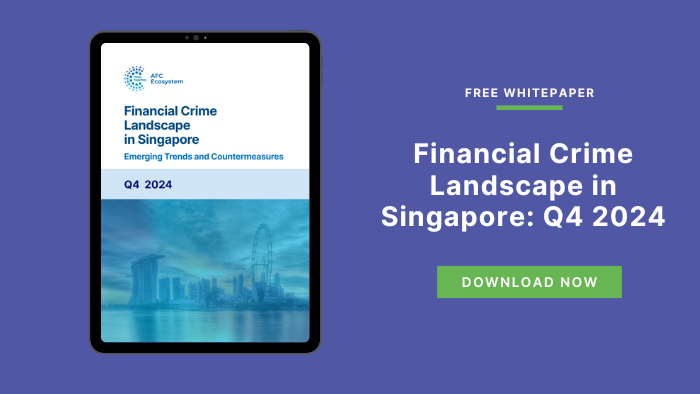Strengthening Money Laundering Compliance in Singapore: How Smart Solutions Are Raising the Bar
Money laundering compliance is under the spotlight in Singapore after a string of high-profile financial crime cases.
As one of Asia’s leading financial hubs, Singapore is known for its rigorous regulatory standards—but recent incidents have revealed vulnerabilities that even the most robust systems struggle to contain. Banks and financial institutions are now under increased pressure to enhance detection, improve reporting accuracy, and adopt smarter technologies.
In this article, we explore how Tookitaki’s AML compliance solutions are helping institutions in Singapore meet these evolving expectations—with scalable technology, localised insights, and a collaborative ecosystem designed to detect financial crime with greater accuracy.
Understanding the AML and Compliance Landscape in Singapore
As a premier financial hub, Singapore attracts global businesses and investors. However, with this prominence comes heightened risks of financial crimes, particularly money laundering and terrorist financing. To counter these threats, the Monetary Authority of Singapore (MAS) has established a robust AML and compliance framework, requiring financial institutions to implement stringent safeguards against illicit activities.
Key Regulations Governing AML Compliance in Singapore
Singapore's AML compliance framework is anchored in a set of regulations designed to prevent financial institutions from being exploited for money laundering and terrorism financing. The primary regulatory requirements include:
MAS Notice 626: This regulation sets forth AML/CFT (Anti-Money Laundering and Countering the Financing of Terrorism) obligations for financial institutions, including:
- Customer Due Diligence (CDD): Institutions must verify the identities of customers and assess the risk of illicit activity.
- Ongoing Transaction Monitoring: Financial institutions must monitor transactions for unusual activity that may indicate money laundering.
- Suspicious Transaction Reporting (STR): Any suspicious financial activity must be promptly reported to the Suspicious Transaction Reporting Office (STRO).
Corruption, Drug Trafficking and Other Serious Crimes (Confiscation of Benefits) Act (CDSA): This act criminalizes money laundering and imposes obligations on financial institutions to prevent the handling of illicit proceeds.
Terrorism (Suppression of Financing) Act (TSOFA): This legislation targets the financing of terrorist activities and requires financial institutions to freeze and report assets linked to designated individuals or entities.
Financial Action Task Force (FATF) Compliance: As a FATF member, Singapore aligns its AML regulations with global best practices, ensuring compliance with international financial crime prevention standards.
With regulatory bodies intensifying enforcement and penalties, financial institutions must adopt advanced AML solutions to remain compliant and mitigate risks effectively.
The Role of the Monetary Authority of Singapore (MAS) in AML and Compliance
The Monetary Authority of Singapore (MAS) is the primary regulatory body overseeing AML and compliance in the country. MAS plays a critical role in not only setting anti-money laundering (AML) and countering the financing of terrorism (CFT) regulations but also ensuring strict enforcement through audits, inspections, and penalties for non-compliance.
Singapore takes a zero-tolerance approach to financial crime, and MAS collaborates closely with global regulatory bodies such as the Financial Action Task Force (FATF) to ensure its AML framework aligns with international best practices.
Key MAS Guidelines and Notices on AML/CFT Compliance
To ensure a robust financial crime compliance framework, MAS has issued several key regulations that financial institutions must adhere to:
1. MAS Notice 626 – AML/CFT Requirements for Banks
This regulation mandates banks to implement risk-based AML measures, covering:
- Customer Due Diligence (CDD): Enhanced verification processes to assess financial risks.
- Transaction Monitoring: Identifying and reporting unusual financial activities.
- Suspicious Transaction Reporting (STR): Promptly escalating suspected money laundering cases to authorities.
- Internal Controls & Training: Establishing AML compliance programs and employee training.
2. Guidelines for Direct Life Insurers (MAS Notice 314)
- Provides specific AML/CFT guidelines for life insurance companies, ensuring that life policies are not misused for money laundering.
3. Guidance on Effective AML/CFT Transaction Monitoring Controls
- Outlines MAS’ key recommendations following thematic inspections of banks’ AML systems, focusing on enhanced risk-based monitoring.
4. Guidelines to MAS Notice SFA04-N02 – AML/CFT for Capital Markets Intermediaries
- Provides AML compliance requirements for Capital Markets Services license holders and exempt persons dealing in securities and financial products.
5. Information Paper on Strengthening AML/CFT Practices for External Asset Managers (EAMs)
- Highlights MAS' supervisory expectations, including best practices and real-world examples of effective AML frameworks for asset managers.
MAS continues to refine its regulatory framework, ensuring that Singapore remains a global leader in financial crime prevention. Financial institutions must stay updated with these evolving compliance requirements to mitigate risks and avoid severe penalties.
The Importance of AML and Compliance for Financial Institutions
For financial institutions in Singapore, AML and compliance are not just regulatory requirements—they are essential for ensuring trust, financial integrity, and long-term stability. With increasing regulatory scrutiny from the Monetary Authority of Singapore (MAS) and international bodies like the Financial Action Task Force (FATF), non-compliance can lead to severe penalties, legal consequences, and reputational damage.
Challenges in Meeting AML and Compliance Requirements in Singapore
Ensuring AML compliance in Singapore is a complex and evolving challenge. Financial institutions must navigate stringent regulations, evolving financial crime tactics, and operational hurdles to meet the high standards set by the Monetary Authority of Singapore (MAS). Understanding these challenges is essential for mitigating risks and ensuring regulatory adherence.
High Regulatory Standards & Evolving Requirements
Singapore’s AML and compliance framework is among the most rigorous globally, requiring institutions to:
- Implement comprehensive AML/CFT programs, including customer due diligence (CDD), transaction monitoring, and suspicious activity reporting.
- Adapt to frequent regulatory updates to align with evolving MAS guidelines and global FATF standards.
- Ensure cross-border compliance, as Singapore’s financial system is interconnected with international markets.
The Challenge: Keeping pace with frequent AML regulatory updates while ensuring full compliance across digital banking, fintech, and traditional financial services.
Common Pitfalls in AML Compliance
Even with dedicated AML teams, financial institutions struggle with key compliance challenges, including:
- Inadequate Customer Due Diligence (CDD): Weak identity verification processes can allow bad actors to exploit financial systems.
- Failure to Detect Suspicious Transactions: Traditional rule-based detection often results in false positives or missed high-risk activities.
- Delayed or Inaccurate Reporting: Late or incomplete Suspicious Transaction Reports (STRs) can trigger regulatory penalties.
The Solution: AI-powered AML solutions that enhance transaction monitoring, reduce false positives, and automate suspicious activity detection.
The High Cost of Non-Compliance
The financial and reputational risks of non-compliance are severe:
- Hefty Fines & Legal Action: Non-compliant institutions face millions in fines from MAS and may face legal repercussions.
- License Revocation: Serious AML violations can lead to business closure or operational restrictions.
- Reputational Damage: Loss of customer trust and negative media coverage can severely impact business sustainability.
Real Case: In recent years, MAS has intensified enforcement actions, imposing significant fines on financial institutions failing to meet AML compliance requirements.
Best Practices for Ensuring AML Compliance
To effectively navigate the complex landscape of AML compliance in Singapore, financial institutions must adopt a proactive and strategic approach. By implementing best practices, institutions can not only meet regulatory requirements but also protect themselves from the risks associated with financial crimes.
Adopting a Risk-Based Approach
One of the most effective strategies for AML compliance is adopting a risk-based approach. This involves assessing the risk level of each customer and transaction, allowing institutions to allocate resources where they are most needed. High-risk customers or transactions should undergo more rigorous scrutiny, while lower-risk activities can be monitored with less intensity. This approach ensures that financial institutions focus their efforts on the areas that pose the greatest threat, making compliance efforts more efficient and effective.
Continuous Monitoring and Reporting
Compliance doesn’t stop at customer onboarding—it requires ongoing monitoring and timely reporting of suspicious activities. Continuous monitoring helps institutions detect unusual patterns or behaviours that may indicate money laundering or other financial crimes. Moreover, timely reporting to the relevant authorities, as required by MAS, is crucial for staying compliant and avoiding penalties. Advanced tools like FinCense make this process more manageable by automating monitoring and providing real-time alerts.
Leveraging Technology for Effective Compliance
In today’s digital age, technology plays a critical role in maintaining AML compliance. Automated solutions like FinCense streamline compliance processes, reduce human error, and provide real-time insights into potential risks. By leveraging technology, financial institutions can stay ahead of evolving threats, ensuring that their compliance efforts are both comprehensive and up-to-date. Moreover, using an integrated platform that aligns with MAS guidelines helps ensure that all aspects of AML compliance are covered.
How FinCense Enhances AML Compliance in Singapore
Navigating the complexities of AML compliance in Singapore requires more than just a basic understanding of the regulations—it demands advanced tools and solutions that can keep up with the ever-evolving landscape. Tookitaki’s FinCense platform is designed to meet these challenges head-on, providing financial institutions with the support they need to ensure compliance and mitigate risks.
Overview of FinCense’s Capabilities
FinCense is an all-encompassing AML solution that integrates cutting-edge technology with regulatory knowledge. The platform offers features such as real-time transaction monitoring, automated customer due diligence, and intelligent alert management. These capabilities help institutions detect and respond to suspicious activities quickly and accurately, significantly reducing the risk of non-compliance.
Integration with MAS Guidelines
What sets FinCense apart is its seamless alignment with the Monetary Authority of Singapore’s (MAS) guidelines. The platform is built to meet the specific requirements outlined in MAS Notice 626 and other relevant regulations. By automating compliance processes and providing real-time updates on regulatory changes, FinCense ensures that financial institutions are always operating within the bounds of the law.
Aligning with MAS Regulations and International Standards
Tookitaki's AML Suite is designed to align with the regulatory requirements set forth by the Monetary Authority of Singapore (MAS), as well as the international standards established by organizations such as the Financial Action Task Force (FATF). The suite's innovative capabilities facilitate compliance with MAS guidelines, including risk assessment and mitigation, customer due diligence, suspicious transaction reporting, internal policies, compliance and audit. By adhering to these regulatory frameworks, Tookitaki ensures that financial institutions in Singapore can maintain a robust AML/CFT posture while also fulfilling their obligations under international law.
Strengthen Your Compliance Posture
In the ever-evolving world of financial regulations, AML compliance in Singapore is both a challenge and a necessity for financial institutions. The stringent requirements set forth by the Monetary Authority of Singapore (MAS) demand a proactive and robust approach to compliance. Failing to meet these standards can result in severe penalties, making it crucial for institutions to adopt advanced solutions that streamline and enhance their compliance efforts.
Tookitaki’s FinCense platform is designed to meet these challenges head-on. With its AI-driven capabilities, seamless integration with MAS guidelines, and focus on continuous monitoring and reporting, FinCense empowers financial institutions to stay compliant while efficiently managing risks. As regulatory expectations evolve and technology continues to advance, FinCense ensures that your institution remains not just compliant, but ahead of the curve.
Don’t leave your compliance strategy to chance. Equip your institution with the tools it needs to navigate the complexities of AML compliance in Singapore. Empower your compliance efforts with FinCense and stay ahead in the fight against financial crime.
Anti-Financial Crime Compliance with Tookitaki?






